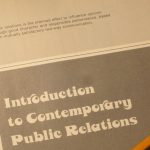by Judi Gunter, BA, APR, FCPRS, L.M.
My late parents were proud of my career success in Public Relations even though they didn’t really know what I actually did for a living. But they figured I must be good at it because I kept getting good jobs and a lot of awards and accolades for doing it.
When I parroted a textbook definition of PR to them 30 years ago — Public relations is the planned effort to influence opinion through good character and responsible performance based upon mutually satisfactory two-way communications – their eyes glazed over.
Mom liked that bit about “good character” though, which supported her notion that St. Judi was saving the world. Dad was especially grateful when I gave him a mnemonic device — that the P stood for “performance” and the R stood for “recognition”.
It was always easier for my parents to explain Judi to their friends when she was a reporter, though, so the description they liked the very best was that my job in PR was to keep getting good stories into the newspaper.
I had left the newsroom in 1970, and had already been practicing PR for a decade when, in 1980, I decided to go for accreditation (APR) with the Canadian Public Relations Society. Back then, the above definition came from the profession’s bible, Effective Public Relations, published in by Cutlip and Center which was already in its 4th edition by the time I actually cracked the cover of a PR text book.
Today’s professionals come into the field with diplomas, undergrad and post graduate degrees yet even with all that scholarship, it was only recently that a modern 21st Century definition was democratically adopted by the Public Relations Society of America.
PRSA announced its up-dated definition, March 1, 2012 is (drum-roll please):
“Public relations is a strategic communication process that builds mutually beneficial relationships between organizations and their publics.”
If they were alive today, my parents’ eyes would still glaze over. As would my explanation that the Americans arrived at their definition using online and digital strategies and social media tactics.
The definition was developed from an extensive online “crowdsourcing” campaign to industry professionals and the general public. After 16,000 web page views, 900 submissions and 70 comments, a “word cloud” formed
From this extensive effort, members of PRSA and a dozen other industry associations (including the Canadian Public Relations Society) shook out three brief definitions and put it to the people. The winner took it with 671 votes, 46.4 percent of the total ballots cast.
But even after all that buzz the Canadians didn’t go along with it, and that’s a subject for another blog.
-30-


